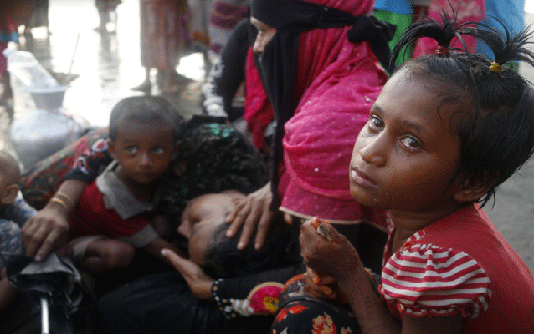DHAKA, March 22, 2019 (BSS) – The International Centre for Diarrhoeal
Disease Research, Bangladesh (icddr,b) today shared its emergency healthcare
response and pre-emptive oral cholera vaccination measures among the forcibly
displaced Rohingyas.
The icddr,b disclosed this through holding a dissemination seminar at Long
Beach Hotel in Cox’s Bazar today, said an icddr,b press release here.
The icddr,b was very quick to respond immediately during the Rohingya
exodus that began in late August, 2017.
The icddr,b and UNICEF jointly conducted a field assessment in Cox’s Bazar
in September, 2017 and identified the potential risks of diarrhoeal disease
outbreak and related mitigation initiatives required.
Accordingly, icddr,b partnered with UNICEF to strengthen healthcare
services for diarrhoeal disease and malnutrition in the Rohingya community.
UNICEF supported the study to evaluate the effectiveness of oral cholera
vaccine administered among the forcibly displaced Myanmar nationals.
The resulting work, which prevented a cholera outbreak, has been described
as ‘The most successful pre-emptive campaign’. Dr Tahmeed Ahmed, senior
director of Nutrition and Clinical Services (NCSD) at icddr,b briefed about
the icddr,b-UNICEF partnership to strengthen acute watery diarrhoea treatment
and preparedness initiatives, which include training of doctors, nurses,
para-medics and community health workers of the Government and NGOs working
in the area.
The initiatives also include management of diarrhoeal disease and
associated malnutrition through five diarrhoeal treatment centres (DTC) in
Leda, Shyamlapur, Balukhali, Teknaf and Ukhia of Cox’s Bazar and DTC-based
diarrheal diseases surveillance.
In the seminar, Dr Azharul Islam Khan, head of hospitals at icddr,b
highlighted the implementation process and experiences in community
engagement and the vital role connecting with all elements of the community
plays in successful dissemination and implementation.
Dr ASG Faruque, senior scientist of NCSD at icddr,b presented on the DTC-
based diarrhoeal disease surveillance activities which included the
recognition that Cox Bazar was a cholera hotspot and sanitation facilities in
the camp created an environment ripe for cholera outbreaks.
He reported that a total of 820 healthcare professionals have been trained
by icddr,b on management of diarrhoeal disease and the diarrhoeal treatment
centres have provided care to 6,156 patients comprised Rohingya and host
communities.
The release said that some 706,364 people were forcibly displaced from the
Rakhine province of Myanmar and took shelter in Ukhiya and Teknaf upazilas of
Cox’s Bazar since the exodus started in late 2017.
Initially, there was huge shortage of basic water, sanitation and hygiene
components and the Rohingyas were in threats of various enteric infections
including cholera. The government of Bangladesh with technical support from
icddr,b and other partner organisations undertook a massive oral cholera
vaccination campaign in Teknaf and Ukhiya upazilas.
During October in 2017 to December in 2018, four rounds of vaccination
campaign took place administering 2.2 million doses of oral cholera vaccine
among the Rohingyas and host community.
Dr Ashraful Islam Khan told the audience that the pre-emptive vaccination
campaign has prevented an epidemic of cholera in Cox’s Bazar, which was
highly anticipated by the global public health community.
Civil Surgeon of Cox’s Bazar Dr Mohammed Abdul Matin, Health Sector
Coordinator Brig General (Retd) Dr Balwinder Sing and National Consultant at
UNICEF Professor Dr Be-Nazir Ahmed also spoke on the occasion.
Besides, representatives from the World Health Organisation (WHO), UNICEF
and other stakeholders attended the seminar.



